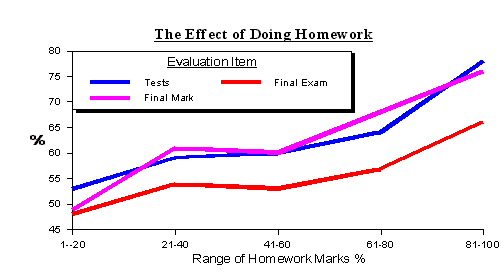The Question of Homework
The debate on whether homework is beneficial is not easy to research or determine since it is not a straightforward issue. There are so many factors affecting the outcome, that at best, only correlations can be made and correlations are notoriously manipulated and misinterpreted by vested parties. For example, consider some research I personally conducted. This was based on 2 years of collecting data from my grade 9 science classes at one point in my career.

As you can see there is some correlation between consistently doing homework and marks; however, is the rise in marks due to completing more homework or understanding more as a result of learning from homework or does a rise in mark encourage more homework completion. Could it simply be that students with high marks are afraid to lose marks and so just complete homework out of fear (definitely not helpful or the goal). This is also an extremely biased area of study as everyone has a personal connection and subsequently an opinion as to the value and proper use of homework. Personally, I would rather not have homework and I would prefer to not have to assign any; however, I also know that I would not have been successful in my learning career without having homework. I also know that I need to continue to spend time each night doing homework (beyond marking and paperwork) to explore ways to successfully engage students in class. I further realize that many students have trouble fully focusing in class to allow deep insightful meta-cognitive change leading to enhanced understanding (this is quite normal). Finally, many students are pushing themselves hard to improve their skills and understanding and like any growth exercise, more engagement ultimately achieves that improvement. If no homework existed at the high school level, many students would not progress at the pace they desire as the ministry expectations do not allow much time for longer in-class deliberation of concepts. So perhaps a look at the current research is warranted.
 All studies show that most students spend time doing daily homework of some form; it has become synonymous with education and success-driven goals. The question as to the validity of homework stems more from the cost it imposes in terms of anxiety and use of time at home with the support for less homework stemming from a desire to let students have more free time and rest at home. Recent research suggests this is certainly more appropriate for younger students below grade 2 as the use of homework before this grade seems to offer no benefits. Use of homework from that point on seems to support the notion of skill-building and developing a proper work ethic (accountability, time-management, attention span, etc.). The exception to this appears to be reading. More reading at any age appears to have clear benefits at any age and for all learners in every capacity.
All studies show that most students spend time doing daily homework of some form; it has become synonymous with education and success-driven goals. The question as to the validity of homework stems more from the cost it imposes in terms of anxiety and use of time at home with the support for less homework stemming from a desire to let students have more free time and rest at home. Recent research suggests this is certainly more appropriate for younger students below grade 2 as the use of homework before this grade seems to offer no benefits. Use of homework from that point on seems to support the notion of skill-building and developing a proper work ethic (accountability, time-management, attention span, etc.). The exception to this appears to be reading. More reading at any age appears to have clear benefits at any age and for all learners in every capacity.
Once students reach high school, the benefits of homework appear to be more engagement and mark focused. However, that is only true if the homework is timely, appropriate in amount and difficulty and leads to further discussion/exploration in class to nurture the growth of the learner. All of these are within some control by the teacher assigning the homework. At the same time, the effectiveness of the homework also relies on the student doing the homework. Working in an interrupted environment with music/television/internet and constant texting etc. never allows the student to engage is deep thinking/analysis which typically requires 20-30 minutes of direct intense focus to achieve. As a result, learning is superficial and fragmented. In addition, many students complete homework to simply get it done, and/or to satisfy those that are imposing the work and there is the further complication of the situation where tutors simply do the homework for the student. This never leads to any substantial growth beyond mere accidental associations made by exposure to the material. In the end, even if homework is assigned the right way with the proper intentions and completed to engage and support authentic learning in students, measuring the success of the homework is challenging since there is no way to know if changes were due to the homework exercise, time, meta cognition or may have resulted simply from in-class exposure and etc. It is also hard to measure because the people measuring the outcomes are quite biased from concerned parents/guardians, eager/expectant teachers and student self-reporting. It is just all very messy and will remain a highly contentious topic in education.

I
have always seen my own homework as setting the stage for the next round of growth. It allows me to contemplate novel information better when I am confronted with it in the classroom. It equips me to be better prepared for learning and so I see it simply as work to enhance my skills and knowledge, akin to how hockey practice allows me to try new things, see things a different way and analyze what I need to do to be a better hockey player during the game when it truly matters.
I believe there is some value in homework and and I try make sure it creates value for the student as well. I spend a considerable amount of time trying to work out the appropriate amount of work and time-line for homework for all my students. I always explain this all these aspects to students so they clearly understand that it is assigned to help them become better learners and that their needs are being valued as well. I never use homework as punishment or as a reward system beyond providing opportunities for growth; that is, I don't just assign if for the sake of having homework. To support a wiser use of homework time, I try to ensure most of it is a priming type of work to open the path to enhanced understanding which will lead to further exploration in class. To do this, I rely heavily upon the flipped-learning model because it puts the homework to real use by ensuring that it enables and supports a dynamic interactive growth-oriented classroom. It sets a foundation for authentic learning and allows the classroom to be more productive at a higher level of critical thinking. It ensures students develop the global competencies to be successful at the next level by providing them with a firm foundation for learning.

Some Additional Key Aspects to Enhance Homework Value
The Teacher Should:
- Vary homework assignments: short-term and longterm; practice of new skills; written or oral reports; preparation for new lessons; research projects; enrichment exercises; assignments to spur creativity; etc.
- Daily assignments should not be overly long: research shows that teachers usually underestimate the amount of time necessary for students to complete homework (I try really hard to justify the time spent)
- Give classroom assignments built on homework to reinforce the value of homework.
- Give importance to homework through oral comments and by scoring papers regularly.
- Apply effective instructional practice to homework: frequent practice, good preparation, high success rate, check for understanding, correction and reteaching as necessary.
- Assure that students have concepts and skills necessary to do the assignment: insufficient preparation for homework may result in higher levels of student frustration.
- Review the assignment before giving it to students and anticipate difficulties.
- Teach students the skills they need to study: organizing, listening, outlining, note-taking, etc.
- Give clear instructions.
- Be clear in informing students that they are responsible for the work and must complete assignments.
- Be clear on how homework assignments are tied to grades.
- Define "late" for assignments and consequences for lateness, and clearly communicate both to students.
- Repeat periodically.
- Make sure students understand the reasons for the assignment.
- Have students write down assignments or hand out written assignments rather than relying only on communicating assignments orally.
- Correct homework quickly and put it to use in the classroom.
- Do not accept incomplete homework: return it to students for completion and enforce appropriate, announced consequences.
- In giving feedback, stress developmental comment: rather than give the correct answer, lead students through the process again so understanding is assured. Emphasize improvements and successes indicated by completed homework assignments.
- Give recognition to students for its completion.
- Contact parents/guardians early if the student begins to develop a pattern of late or incomplete work.
The Student Should
- Set a regular study time each day that is not to be interrupted by family plans, school activities or electronic devices and with a definite beginning and ending time. The goal is to complete homework without interruption or intrusion so you can deeply focus on the content.
- Establish a study area, away from household distractions, with good light and space for studying.
- Be prepared and organized. Make a daily list of homework assignments so you can monitor progress on work.
- Keep caught on on daily homework especially if you know you will be away. It is always better to plan ahead than to deal with catching up.
- Work to find the answer rather than doing the work just to get it done.
- If you are stuck, try to work through the issue jotting down thoughts and attempts to show your work to the teacher and to enable growth in class when the homework is discussed.
- Be sure all assignments are clear: don't be afraid to ask questions if necessary.
- Alert the teacher if homework is creating stress or anxiety so together you can work out coping strategies and develop a more positive homework experience.

Some Time Management Tips to Aid in the Process
- Make a "To Do" List Every Day. Put things that are most important at the top and
do them first. If it's easier, use a planner to track
all of your tasks. And don't forget to reward yourself
for your accomplishments.
- Use Spare Minutes Wisely. Get some
reading done on the bus ride home from school, for
example, and you'll kill two birds with one stone.
- It's Okay to Say "No." If your boss asks you to work on a Thursday night
and you have a final exam the next morning, realize
that it's okay to say no. Keep your short- and long-term
priorities in mind.
- Find the Right Time. You'll work
more efficiently if you figure out when you do your
best work. For example, if your brain handles math
better in the afternoon, don't wait to do it until
late at night.
- Review Your Notes Every Day. You'll
reinforce what you've learned, so you need less time
to study. You'll also be ready if your teacher calls
on you or gives a pop quiz.
- Get a Good Night's Sleep. Running
on empty makes the day seem longer and your tasks
seem more difficult.
- Communicate Your Schedule to Others. If phone calls are proving to be a distraction, tell
your friends that you take social calls from 7:00
to 8:00 p.m. It may sound silly, but it helps.
- Become a Taskmaster. Figure out
how much free time you have each week. Give yourself
a time budget and plan your activities accordingly.
- Don't Waste Time Agonizing. Have
you ever wasted an entire evening by worrying about
something that you're supposed to be doing? Was it
worth it? Instead of agonizing and procrastinating,
just do it.
- Keep Things in Perspective. Setting
goals that are unrealistic sets you up for failure.
While it's good to set high goals for yourself, be
sure not to overdo it. Set goals that are difficult
yet reachable.
Consider these tips, but personalize your habits so
that they suit you. If you set priorities that fit your
lifestyle, you'll have a better chance of achieving
your goals.

References
Nix Homework to Help Students? What the Science Says By Cari Nierenberg
Purposes for Doing Homework Reported by Middle
and High School Students by Jiazhong Xu
Does Homework Contribute to Student Success by Jo Earp
The Value of of Homework: Is Homework a Valuable Tool for Learning in the Classroom by Steven A. Carbone II
The Effects of Homework on Student Achievement by Jennifer M. Hayward
Homework Research Paper Starter
School Improvement Research Series: Homework by Jocelyn A. Butler |




